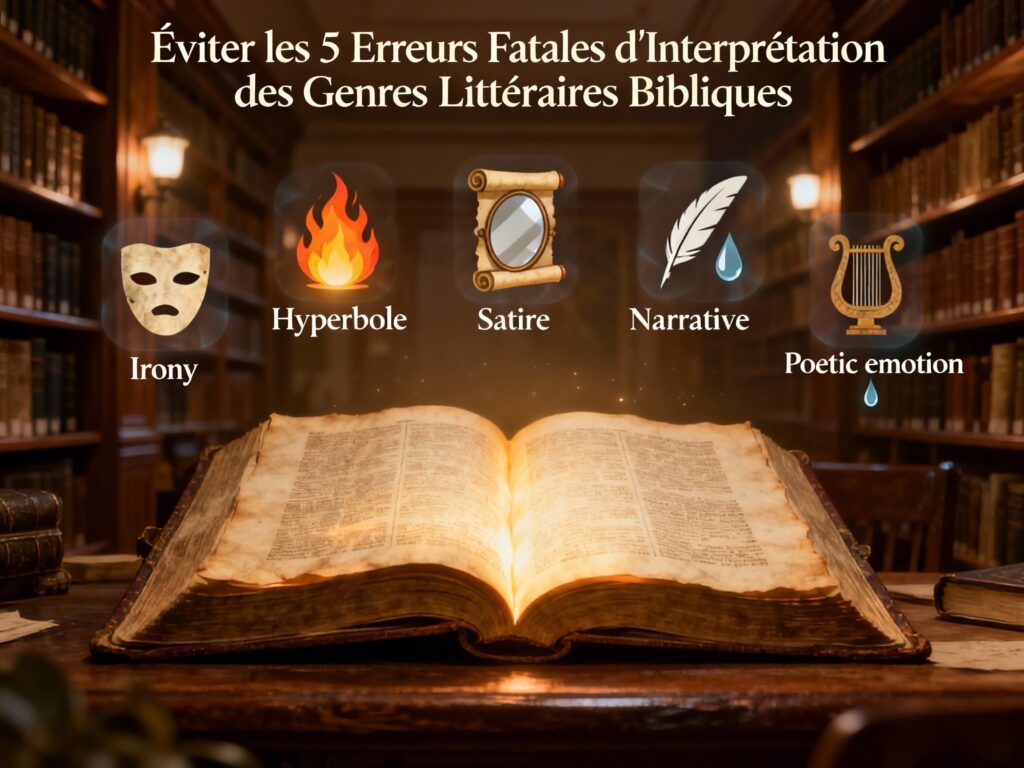Have you ever felt completely lost when faced with a passage from the Bible? This familiar feeling of intellectual confusion often hides a liberating reality: you have not failed in your understanding, you have simply applied the wrong approach to reading.
Bible study transforms millions of lives every day, but it can also become a source of deep frustration when we misinterpret thebiblical literary genres. Imagine discovering that your difficulties in understanding do not reveal your incompetence, but rather your need to adjust your approach.
This gradual revelation awaits you in the pages that follow. Each error we will explore together represents an interpretive constraint from which you can free yourself today. Prepare to experience this feeling of intellectual liberation that transforms Bible study from an intimidating exercise into a fascinating discovery.
Why literary genres determine your understanding
Your brain naturally processes different types of texts with distinct filters. When you read a love poem, your mind spontaneously activates your emotional sensitivity. When faced with a technical manual, you automatically switch to a precise analytical mode.
This natural cognitive adaptation is the key to biblical interpretation.. The biblical authors were masters of choosing the optimal literary genre to convey their specific message. They used satire to criticize without destroying, hyperbole to create a profound emotional impact, and prophetic irony to reveal hidden truths.
Unfortunately, this literary richness becomes a deadly trap when we apply a uniform approach to all texts. It's exactly like trying to repair a watch with a hammer: the tool may be excellent, but it remains completely unsuitable for the task.

Fatal error #1: taking prophetic irony at face value
Prophetic irony represents one of the most sophisticated genres in biblical literature, and paradoxically one of the most misunderstood by contemporary readers. This technique consists of expressing a profound truth using seemingly contradictory language.
Recognizing prophetic irony requires sensitivity to emotional and cultural context. Prophets used this technique to provoke awareness in their listeners, creating an intellectual shock that paved the way for spiritual transformation.
Picture this scenario: imagine a prophet who proclaims blessings over actions he morally condemns. This apparent contradiction does not reveal an inconsistency in the text, but rather a rhetorical strategy intended to expose the absurdity of certain behaviors.
When you take these ironic passages at face value, you transform scathing criticism into confused approval. ThisBible reading method Erroneous misunderstandings generate profound spiritual misunderstandings that can distort your understanding of essential messages.
How to identify prophetic irony
Develop your irony radar by observing the stark contrasts between the apparent tone of the message and the author's usual values. Prophetic irony often creates deliberate cognitive tension that forces the reader to dig deeper.
This recognition transforms your reading experience: instead of experiencing confusion, you begin to appreciate the literary intelligence unfolding before your eyes.

Fatal Error #2: Missing the Power of Biblical Hyperbole
Biblical hyperbole functions as an emotional amplifier, not as a precise factual report. This crucial distinction escapes many readers who seek literal accuracy in passages designed to create maximum psychological impact.
The biblical authors were masters of the art of expressive exaggeration. They knew that an exaggerated image is more deeply imprinted in the memory than a moderate description. This technique aims to touch hearts and minds, not to provide statistical data.
When you interpret these hyperbolic passages literally, you completely miss their true purpose. Worse still, you risk creating artificial contradictions that exist only in your inappropriate reading approach.
This intellectual liberation begins as soon as you understand that the’biblical hyperbole The authors sought to touch your heart before convincing your intellect. They used striking imagery to anchor their teachings in your emotional memory.
Transform your approach to hyperbole
Develop a new sensitivity to expressive language by asking yourself: "What feeling is this author trying to evoke in me?" This simple question redirects your attention from factual accuracy to intentional emotional impact.
This shift in approach suddenly reveals the beauty and power of passages that previously seemed problematic or confusing.

Fatal error #3: ignoring the subtlety of biblical satire
Biblical satire is perhaps the most delicate genre to master, for it criticizes without destroying, exposes without humiliating. This sophisticated literary technique uses humor and exaggeration to reveal uncomfortable truths.
Biblical satire genres function like distorting mirrors. They amplify certain traits to make them visible and memorable. The goal is never gratuitous mockery, but always to raise awareness and encourage change.
Imagine if you completely missed the irony in a conversation with a close friend. You might interpret their affectionate teasing as personal attacks, creating unnecessary relational misunderstandings. The same phenomenon occurs with misunderstood biblical satire.
This lack of understanding transforms passages intended to provoke personal reflection into sources of theological confusion. You thus lose access to a wealth of practical teachings hidden beneath the satirical veneer.
Develop your satirical sensibility
Develop your ability to perceive satire by looking for elements of deliberate exaggeration and intentionally heightened contrasts. Biblical satire often reveals its intentions through its manifestly disproportionate nature.
This new skill unlocks layers of meaning that greatly enrich your textual understanding.

Fatal error #4: confusing narration and historical documentation
Biblical narrative genres teach by example rather than explicit doctrine. This fundamental distinction escapes those who seek in every story a direct prescription for their own lives.
Biblical narrative structures favor indirect teaching. They present complex situations that allow readers to discover universal principles through vicarious experience.
Picture this situation: you watch a biographical film to understand the story, but you end up learning profound life lessons about courage, perseverance, or integrity. Biblical narratives operate on the same pedagogical principle.
When you treat these stories as purely factual reports, you risk focusing on secondary details and missing the main lessons. This approach reduces the narrative richness to a simple chronology of events.
This shift in perspective liberates your Bible study for beginners or confirmed by the constraints of an overly rigid reading. You discover that biblical narratives offer practical wisdom accessible through identification with the characters and situations.
Extracting narrative wisdom
Develop your ability to identify universal themes hidden within specific details. Every biblical narrative contains patterns of behavior and consequences that transcend their immediate historical context.
This skill transforms your reading from simple information consumption into a personalized learning experience.

Fatal error #5: neglecting emotion in poetic structures
Biblical poetic structures prioritize emotion over factual precision, creating spaces for spiritual expression that touch the soul before convincing the intellect. This emotional focus often disconcerts readers accustomed to purely logical analysis.
Biblical poetry functions like a musical score. It creates an atmosphere, evokes feelings, and establishes deep resonances with the universal human experience. Its value lies in its ability to express the inexpressible.
Imagine if you analyzed a love song solely for its geographical accuracy or chronological coherence. You would completely miss its true essence: its ability to express and evoke genuine emotions.
This flawed approach deprives your Bible study of its most powerful transformative dimension. You reduce expressions of praise, lamentation, or worship to mere factual descriptions.
Liberation begins when you accept that the Bible reading methods must adapt to the emotional and expressive nature of the poetic genre. This adaptation opens your sensitivity to spiritual dimensions that are often neglected.
Cultivate your poetic receptivity
Develop your capacity to feel before you analyze. Let the poetic images create their emotional impact before attempting to dissect them intellectually. This sequence respects the authors' original intention.
This approach transforms your reading experience from a simple mental exercise into an authentic spiritual encounter.

Your intellectual liberation begins now
These five fatal mistakes’Bible interpretation errors They may have hindered your understanding for years. But recognizing them marks the beginning of your true intellectual liberation.
Each interpretive constraint you identify becomes a lever for personal growth. You no longer need to suffer the frustration of incomprehensible passages: you now possess the keys to adapt your approach to the specific character of each literary genre.
This shift in approach makes Bible study less intimidating and infinitely more accessible. You can finally understand passages that troubled you, transforming your relationship with the texts from a source of anxiety into a source of fascinating discovery.
Your first practical step Choose a passage that has always posed a problem for you and identify its specific literary genre. Then apply the appropriate approach that we have just explored together.
This personal discovery will trigger that feeling of gradual revelation that permanently transforms your learning experience. You will realize that your intelligence was perfectly capable of understanding: it simply needed the appropriate interpretive tools.
The adventure of your renewed understanding begins now. What mistake will you correct first?



